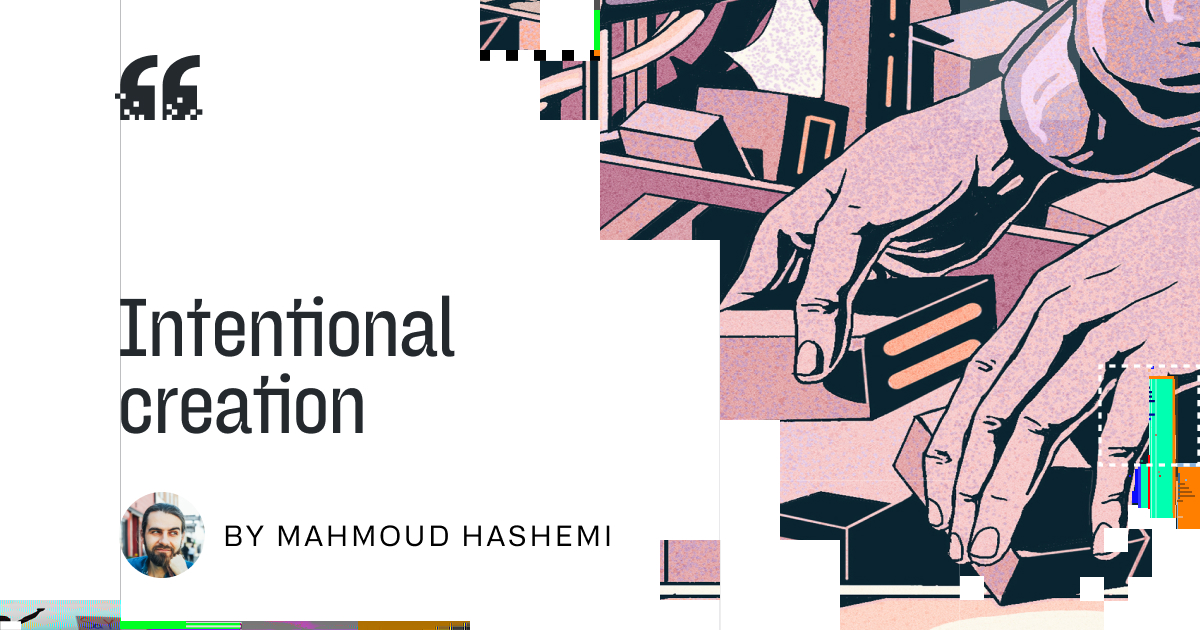
About
Title: Intentional Creation Authors: GitHub Category:articles Number of Highlights: 6 Source URL: https://github.com/readme/guides/intentional-creation?mc_cid=d29dfa2f77&mc_eid=c18a4418f1 Date: 2024-03-03 Last Highlighted: 2024-03-03
Highlights
We all have it. Whether it gets you up in the morning or keeps you up at night, you’ve felt it: creative potential.
Tags:creativity,passion
To create, we must first recognize its inverse: consumption. Consumption is a useful stage, but can be dangerous if it’s terminal. An infinite loop in this stage kills any chance of creation. But little is created in a vacuum. Creation still starts with consumption, albeit consumption disarmed with an intention: Research and critique
If you’re not reflecting, you’re not learning
Note: It’s interesting to consider how this is geared towards creativity but so closely aligns with things like philosophical thought. Not to mention a clear parallel to therapeutic journaling.
More generally, be wary of one-size-fits-all solutions; while prescriptive techniques such as the Zettelkasten Method may work for some, creation is idiosyncratic. Embrace your own process.
Note: Taking what works and making your own system that you enjoy is the path to success.
There are a few notable benefits of intentional creation:
-
When you’ve built something, the influences are well-documented. It can be easier to involve others when there’s a clear creative thread to pull on.
-
Sharing your critiques and curations invites collaboration with other creators and curators.
-
Self-awareness. If you’re not finding your critiques crystallizing into new thoughts and ideas for projects, that’s a sign you’re looking at the wrong stuff. Are you following your interests or passively consuming trending content?
There are a few notable benefits of intentional creation:
-
When you’ve built something, the influences are well-documented. It can be easier to involve others when there’s a clear creative thread to pull on.
-
Sharing your critiques and curations invites collaboration with other creators and curators.
-
Self-awareness. If you’re not finding your critiques crystallizing into new thoughts and ideas for projects, that’s a sign you’re looking at the wrong stuff. Are you following your interests or passively consuming trending content?
---- There are a few notable benefits of intentional creation:
- When you’ve built something, the influences are well-documented. It can be easier to involve others when there’s a clear creative thread to pull on.
- Sharing your critiques and curations invites collaboration with other creators and curators.
- Self-awareness. If you’re not finding your critiques crystallizing into new thoughts and ideas for projects, that’s a sign you’re looking at the wrong stuff. Are you following your interests or passively consuming trending content? (View Highlight)creativitycollaborationself-awareness
- There are a few notable benefits of intentional creation:
- When you’ve built something, the influences are well-documented. It can be easier to involve others when there’s a clear creative thread to pull on.
- Sharing your critiques and curations invites collaboration with other creators and curators.
- Self-awareness. If you’re not finding your critiques crystallizing into new thoughts and ideas for projects, that’s a sign you’re looking at the wrong stuff. Are you following your interests or passively consuming trending content? (View Highlight)documentationpassivecreativitycriticism